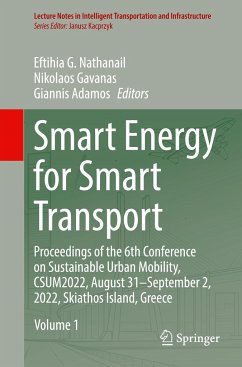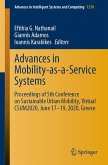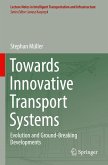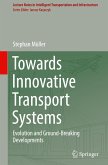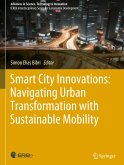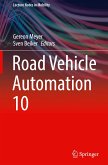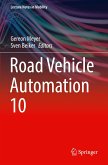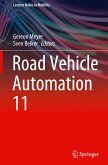Smart Energy for Smart Transport
Proceedings of the 6th Conference on Sustainable Urban Mobility, CSUM2022, August 31-September 2, 2022, Skiathos Island, Greece
Herausgegeben:Nathanail, Eftihia G.; Gavanas, Nikolaos; Adamos, Giannis
Smart Energy for Smart Transport
Proceedings of the 6th Conference on Sustainable Urban Mobility, CSUM2022, August 31-September 2, 2022, Skiathos Island, Greece
Herausgegeben:Nathanail, Eftihia G.; Gavanas, Nikolaos; Adamos, Giannis
- Broschiertes Buch
- Merkliste
- Auf die Merkliste
- Bewerten Bewerten
- Teilen
- Produkt teilen
- Produkterinnerung
- Produkterinnerung
This book reports on original research and practical findings fostering sustainable and smart urban mobility transformation. Gathering contributions presented at the 6th Conference on Sustainable Urban Mobility, held from August 31 to September 2, 2022, on Skiathos Island, Greece, it covers topics relating to electric and clean energy, intelligent technologies and automation, green travel modes, and transport safety. It highlights solutions for inclusive transportation, sustainable and resilient supply chains, and describes novel strategies for urban planning and innovative transport…mehr
Andere Kunden interessierten sich auch für
![Advances in Mobility-as-a-Service Systems Advances in Mobility-as-a-Service Systems]() Advances in Mobility-as-a-Service Systems161,99 €
Advances in Mobility-as-a-Service Systems161,99 €![Towards Innovative Transport Systems Towards Innovative Transport Systems]() Stephan MüllerTowards Innovative Transport Systems77,99 €
Stephan MüllerTowards Innovative Transport Systems77,99 €![Towards Innovative Transport Systems Towards Innovative Transport Systems]() Stephan MüllerTowards Innovative Transport Systems77,99 €
Stephan MüllerTowards Innovative Transport Systems77,99 €![Smart City Innovations: Navigating Urban Transformation with Sustainable Mobility Smart City Innovations: Navigating Urban Transformation with Sustainable Mobility]() Smart City Innovations: Navigating Urban Transformation with Sustainable Mobility161,99 €
Smart City Innovations: Navigating Urban Transformation with Sustainable Mobility161,99 €![Road Vehicle Automation 10 Road Vehicle Automation 10]() Road Vehicle Automation 10169,99 €
Road Vehicle Automation 10169,99 €![Road Vehicle Automation 10 Road Vehicle Automation 10]() Road Vehicle Automation 10169,99 €
Road Vehicle Automation 10169,99 €![Road Vehicle Automation 11 Road Vehicle Automation 11]() Road Vehicle Automation 11139,99 €
Road Vehicle Automation 11139,99 €-
-
-
This book reports on original research and practical findings fostering sustainable and smart urban mobility transformation. Gathering contributions presented at the 6th Conference on Sustainable Urban Mobility, held from August 31 to September 2, 2022, on Skiathos Island, Greece, it covers topics relating to electric and clean energy, intelligent technologies and automation, green travel modes, and transport safety. It highlights solutions for inclusive transportation, sustainable and resilient supply chains, and describes novel strategies for urban planning and innovative transport infrastructure. This book offers extensive information to academicians, researchers, practitioners and decision makers working on effective strategies to transform urban mobility in a sustainable and equitable way.
Hinweis: Dieser Artikel kann nur an eine deutsche Lieferadresse ausgeliefert werden.
Hinweis: Dieser Artikel kann nur an eine deutsche Lieferadresse ausgeliefert werden.
Produktdetails
- Produktdetails
- Lecture Notes in Intelligent Transportation and Infrastructure
- Verlag: Springer / Springer Nature Switzerland / Springer, Berlin
- Artikelnr. des Verlages: 978-3-031-23720-1
- 1st ed. 2023
- Seitenzahl: 1900
- Erscheinungstermin: 11. März 2023
- Englisch
- Abmessung: 235mm x 155mm x 101mm
- Gewicht: 2815g
- ISBN-13: 9783031237201
- ISBN-10: 303123720X
- Artikelnr.: 66426602
- Herstellerkennzeichnung Die Herstellerinformationen sind derzeit nicht verfügbar.
- Lecture Notes in Intelligent Transportation and Infrastructure
- Verlag: Springer / Springer Nature Switzerland / Springer, Berlin
- Artikelnr. des Verlages: 978-3-031-23720-1
- 1st ed. 2023
- Seitenzahl: 1900
- Erscheinungstermin: 11. März 2023
- Englisch
- Abmessung: 235mm x 155mm x 101mm
- Gewicht: 2815g
- ISBN-13: 9783031237201
- ISBN-10: 303123720X
- Artikelnr.: 66426602
- Herstellerkennzeichnung Die Herstellerinformationen sind derzeit nicht verfügbar.
Is the shift to electrification and powertrain improvement sufficient to change urban mobility impact on climate change?.- The dynamic relation of climate change and energy transition with transport and mobility policies in the EU through social media data mining.- Park-and-ride: The case for coupling EV charging stations with micro-mobility hubs in residential areas.- Metro braking energy for station electric loads: The business case of a smart hybrid storage system.- The impact of the transport sector on the environment in the context of globalization.- Forecasting the passenger car demand split from public perceptions of electric, hybrid, and hydrogen-fueled cars in Greece.- Demand responsive feeder bus service using electric vehicles with timetabled transit coordination.- Investigation of user's preferences on electric passenger cars.- A large scale simulation of the electrification effects of SAVs.- Design and development of power electronic booster to extend the range of supercapacitor powered electric bicycle.- Driver-in-the-loop simulator of electric vehicles.- Observations on the driving of plug-in hybrid cars in real-world conditions.- Research trends and opportunities related to charging and supply systems for vehicles with electric / hybrid propulsion.- Dynamic charging management for electric vehicle demand responsive transport.- A regional civilian airport model at remote island for smart grid simulation.- An innovative smart charging framework for efficient integration of plug-in electric vehicles into the grid.- A blockchain-based smart contractual framework for the electric vehicle charging ecosystem.- Investigating the option of developing a power supply network using electricity in Greek islands: The case of Skiathos island.- Innovative non-polluting traffic light crossroads.- System for avoiding traffic jams of intervention vehicles.- A mobile computing based tool for low-emission driving.- Discrepancy between hyperpath and actual route choices based on smart-card data in Shizuoka, Japan.- Developing a heuristic route planning method to support seamless mobility solutions.- A large-scale traffic scenario of Berlin for evaluating smart mobility applications.- Smart parking: An image processing-based intelligent parking system.- Total cost of ownership impact on MaaS system appeal: An agent based approach.- A recommendation engine for a smart parking ecosystem.- A crowdsourcing framework for reporting available parking spots in urban areas.- A review of use cases of gamification in mobility systems and services.- An innovative mobile application for booking parking spaces.- AI driven adaptive scheduling for on-demand transportation in smart cities.- Decision intelligence based on big data for user-oriented trip planner development.- Framework for urban C-ITS GLOSA evaluation.- Pursuing technological solutions for tourists' urban travel behavioral change in the post COVID-19 era; the SUSTOURISMO app.- Stakeholders' survey on the introduction of autonomous vehicles in Greece.- Autonomous mobility as a means of innovation diffusion: The case of Trikala,
Greece.- Autonomous vehicles: Impact on human life - a statistic and descriptive overview of research results, using the Delphi method.- Big data analytics for analyzing consumer preferences and satisfaction in public transportation.- Citizen and stakeholder engagement in the development and deployment of automated mobility services, as exemplified in the SHOW project.- Transportation systems of Asia: Investigating the preferences for their implementation in Greece with the use of the Maximum Difference (MaxDiff) scaling method.- Digital infrastructure service role and functional model for urban ITS service applications.- Innovative technologies and systems for urban mobility: The case of Padua.- Using C-ITS for shockwave damping and preventing on highways.- Relationship and differences between entrepreneurship and research in the crowdmapping project for crowdsourced urban data.- Repurposing open traffic data for estimating the mobility performance.- Evaluating the quality of public spaces using crowdsourcing data: The case of the metropolitan area of Thessaloniki.- Application of smart windows equipped with radiant internal curtains to improve thermal comfort in urban transport vehicles.- Urban transport vehicles equipped with HVAC systems based in ceiling-mounted air distribution systems.- Automared vehicles' effects on urban traffic flow parameters.- The impact of CNG on buses fleet decarbonization.- A study on the use of autonomous vehicles for the interconnection of urban transport interchanges.- Optimization-based comparison of rebalanced docked and dockless micromobility systems.- Quantifying the charging flexibility of electric vehicles; an improved approach with realistic travel patterns.- How rightsized shared autonomous electric vehicles could slash CO2 emissions and resource use while making cities more livable and transport more enjoyable.- A stated adaptation approach to assess mode change behavior of car drivers in presence of Park and Ride facilities.- Estimating availability effects in travel mode choice among e-bikes and other sustainable mobility services: Results of a stated portfolio choice experiment.- Role of service uncertainty in decision to use demand responsive transport services: A stated adaptation choice experiment.- How is the redesign of public space for active mobility and healthy neighborhoods perceived and accepted? Experiences from a temporary real-world experiment in Berlin.- Emergent bicycle infrastructure during the COVID-19 pandemic; The Karamanli Avenue pop-up cycle lane in Thessaloniki, Greece.- Pedestrian movement and the built environment - A bigdata-based analysis.- Walkability evaluation: the case studies of Veroia and Igoumenitsa, Greece.- Evaluation of temporary mobility measures due to the COVID-19 pandemic in the city of Thessaloniki, Greece.- Anthropocentric design of sidewalks with the use of conjoint analysis.- Context-aware bicycle route planning.- Promoting public and active transport based intermodal mobility; The Adriatic - Ionian experience.- Social media and urban mobility choices: How a transport-related content could be influential in social media.- Smart and resilient urban mobility during the COVID-19 pandemic. The case of a southern European medium-sized city.- Supporting behavioural change towards cycling through cycle safety interventions for children.- Policies to promote and uptake soft mobility in the Mediterranean.- Active mobility versus motorized transport of high school students in Orestiada municipality of Greece.- Modal shift towards active transport during the Covid-19 restrictions: Can we maintain this trend?.- Evaluating route choice characteristics of e-scooters.- What is leading the choice between motorized and non-motorized transport modes? The case of Porto metropolitan area.- A joint methodological approach for interpreting school mobility patterns and decisions.- Mobility patterns inthe campus of the University of Patras.- The impact of Covid-19 pandemic on active mobility - Belgrade example.- Understanding group social ties and their impact on travel behaviour.- An evaluation of agent-based models for simulating e-scooter sharing services in urban areas.- Reinforcing competitiveness of transport SMEs in West Midlands region, UK.- Feelings of insecurity, obstacles and conflicts: Issues blind people have with e-scooters in public space and potential improvements.- Involving passengers in creating inclusive digital mobility solutions - findings from the INDIMO project.- Multimodal route planning for blind and visually impaired people.- Insularity, accessibility, and affordability of transport in Greek islands.- Is shared mobility equally accessible to all? An income analysis of service adoption.- Transit fare equity: Understanding the factors affecting different groups of users' payment methods.- Co-designing transport solutions towards an inclusive public transport in the city of Bologna.- Conceptual architecture for an inclusive and real-time solution for parking assistance.- User acceptance of automated shuttle buses - results of a passenger survey in Stolberg.- Public transport versus demand responsive transport services in (extremely) low demand areas: The case of the Sicilian hinterland.- A network analysis model to measure the accessibility of public spaces.- An investigation of distraction factors on road safety.- Optimization of a prospective carpooling service in the regional unit of Thessaloniki with the use of conjoint analysis and market simulation.- Micromobility and micromobility status quo in Greece.- An emerging and innovation transport solution: Towards transforming parking lot to urban consolidation centre: Madrid living lab.- How digital services implementation along international supply chains influences the performance of logistics operations? A bottom-up approach for impact validation and categorization.- Efficient Management of operations in Ro-Ro/Ro-Pax terminals using a cloud-based yard management platform.- The use of drones in city logistics - A case study application.- Towards an integrated framework for smart goods distribution in a middle-sized city.- Crowd shipping for urban logistics: Investigating the factors affecting consumer adoption in Hanoi, Vietnam.- Assessing the evolution of urban planning and last mile delivery in the era of e-commerce.- Is it necessary to calculate passenger car equivalent value for commercial vehicles in urban areas?.- Appropriate key performance indicators for evaluating integrated passenger-freight transport.- The main problems of theroad freight transport sector in Greece.- EN.I.R.I.S.S.T Road freight transport service: An impact oriented policy advice tool.- Anticipation of new and emerging trends for sustainable last-mile urban distribution.- The importance of logistics performance for mitigating transportation-caused pollution.- Optimizing the route and location planning for cargo bikes and mobile parcel stations.- Evaluation of station distribution strategies for next-generation bike-sharing system.- Data-driven approach for defining demand scenarios for shared autonomous cargo-bike fleets.- Determining the demand for loading / unloading zones in urban areas.- Diversification of the bicycle market and consequences for urban infrastructure.- Collaborative distribution solutions in last mile logistics.- Investigating taxi driver behavioral aspects: Evidence from Athens, Greece.- Water management solutions to decrease both water and CO2 consumption in Europe.- Sustainable public transport in Petro ani Basin, Romania - Current status and development perspectives.- The impact of weather on daily ridership of the urban rail transportation system.- Estimating the environmental footprint of the O.A.S.A Group.- A hybrid MCDA methodology to evaluate ferry fleet assignment to routes in the Greek islands.- Sustainable, smart and safe mobility at the core of sustainable tourism in six European islands.- Evaluating road network hierarchy planning suggestions in SUMPs. Evidence from 7 Greek cities.- AURORA - Creating space for urban air mobility in our cities.- Moving towards safe and sustainable mobility: The development of a roaD accidEnts informAtion centeR for Greece (DEAR).- A portable device for supporting autonomous and healthy urban ageing: the PROLONG system.- Asset management: Rules for enhancing resilience.- Impact of Covid-19 on urban traffic patterns.- Definition of a variable speed limit system for the northern access to the city of Barcelona.- Regenerating Athens city centre to a low pollution and restricted vehicle traffic zone.- Analysis and evaluation of mobility solutions and targeted interventions to support the urban regeneration of the Canal Port of Rimini.- Urban air mobility integration to urban planning.- How to monitor and assess sustainable urban mobility? An application of sustainable urban mobility indicators in four Greek municipalities.- Revision of the Budapest mobility plan, and the alignment of urban and transport strategies in Budapest.- An FCM approach to achieve near zero-CO2 urban mobility: The case of Larissa, Greece.- Analyzing pollutant concentrations by wind direction in two main Greek urban centers.- INVESTL2 ontology: Semantic modeling of sustainable living labs.- Evaluation of the current state and trends for the sustainable development of the AGRIFOOD sector of the south central region of Bulgaria.- Information communication technologies and disaster risk management: Systematic literature review.- Innovative Bio-based circular economy schemes: The case of biomass and food waste utilization as an enabler of regional resilience.- Relevant research and development competences - Case INVEST4EXCELLENCE.- Optimizing urban resilience via FCM and participatory modeling: The case of Joensuu Finland.
Greece.- Autonomous vehicles: Impact on human life - a statistic and descriptive overview of research results, using the Delphi method.- Big data analytics for analyzing consumer preferences and satisfaction in public transportation.- Citizen and stakeholder engagement in the development and deployment of automated mobility services, as exemplified in the SHOW project.- Transportation systems of Asia: Investigating the preferences for their implementation in Greece with the use of the Maximum Difference (MaxDiff) scaling method.- Digital infrastructure service role and functional model for urban ITS service applications.- Innovative technologies and systems for urban mobility: The case of Padua.- Using C-ITS for shockwave damping and preventing on highways.- Relationship and differences between entrepreneurship and research in the crowdmapping project for crowdsourced urban data.- Repurposing open traffic data for estimating the mobility performance.- Evaluating the quality of public spaces using crowdsourcing data: The case of the metropolitan area of Thessaloniki.- Application of smart windows equipped with radiant internal curtains to improve thermal comfort in urban transport vehicles.- Urban transport vehicles equipped with HVAC systems based in ceiling-mounted air distribution systems.- Automared vehicles' effects on urban traffic flow parameters.- The impact of CNG on buses fleet decarbonization.- A study on the use of autonomous vehicles for the interconnection of urban transport interchanges.- Optimization-based comparison of rebalanced docked and dockless micromobility systems.- Quantifying the charging flexibility of electric vehicles; an improved approach with realistic travel patterns.- How rightsized shared autonomous electric vehicles could slash CO2 emissions and resource use while making cities more livable and transport more enjoyable.- A stated adaptation approach to assess mode change behavior of car drivers in presence of Park and Ride facilities.- Estimating availability effects in travel mode choice among e-bikes and other sustainable mobility services: Results of a stated portfolio choice experiment.- Role of service uncertainty in decision to use demand responsive transport services: A stated adaptation choice experiment.- How is the redesign of public space for active mobility and healthy neighborhoods perceived and accepted? Experiences from a temporary real-world experiment in Berlin.- Emergent bicycle infrastructure during the COVID-19 pandemic; The Karamanli Avenue pop-up cycle lane in Thessaloniki, Greece.- Pedestrian movement and the built environment - A bigdata-based analysis.- Walkability evaluation: the case studies of Veroia and Igoumenitsa, Greece.- Evaluation of temporary mobility measures due to the COVID-19 pandemic in the city of Thessaloniki, Greece.- Anthropocentric design of sidewalks with the use of conjoint analysis.- Context-aware bicycle route planning.- Promoting public and active transport based intermodal mobility; The Adriatic - Ionian experience.- Social media and urban mobility choices: How a transport-related content could be influential in social media.- Smart and resilient urban mobility during the COVID-19 pandemic. The case of a southern European medium-sized city.- Supporting behavioural change towards cycling through cycle safety interventions for children.- Policies to promote and uptake soft mobility in the Mediterranean.- Active mobility versus motorized transport of high school students in Orestiada municipality of Greece.- Modal shift towards active transport during the Covid-19 restrictions: Can we maintain this trend?.- Evaluating route choice characteristics of e-scooters.- What is leading the choice between motorized and non-motorized transport modes? The case of Porto metropolitan area.- A joint methodological approach for interpreting school mobility patterns and decisions.- Mobility patterns inthe campus of the University of Patras.- The impact of Covid-19 pandemic on active mobility - Belgrade example.- Understanding group social ties and their impact on travel behaviour.- An evaluation of agent-based models for simulating e-scooter sharing services in urban areas.- Reinforcing competitiveness of transport SMEs in West Midlands region, UK.- Feelings of insecurity, obstacles and conflicts: Issues blind people have with e-scooters in public space and potential improvements.- Involving passengers in creating inclusive digital mobility solutions - findings from the INDIMO project.- Multimodal route planning for blind and visually impaired people.- Insularity, accessibility, and affordability of transport in Greek islands.- Is shared mobility equally accessible to all? An income analysis of service adoption.- Transit fare equity: Understanding the factors affecting different groups of users' payment methods.- Co-designing transport solutions towards an inclusive public transport in the city of Bologna.- Conceptual architecture for an inclusive and real-time solution for parking assistance.- User acceptance of automated shuttle buses - results of a passenger survey in Stolberg.- Public transport versus demand responsive transport services in (extremely) low demand areas: The case of the Sicilian hinterland.- A network analysis model to measure the accessibility of public spaces.- An investigation of distraction factors on road safety.- Optimization of a prospective carpooling service in the regional unit of Thessaloniki with the use of conjoint analysis and market simulation.- Micromobility and micromobility status quo in Greece.- An emerging and innovation transport solution: Towards transforming parking lot to urban consolidation centre: Madrid living lab.- How digital services implementation along international supply chains influences the performance of logistics operations? A bottom-up approach for impact validation and categorization.- Efficient Management of operations in Ro-Ro/Ro-Pax terminals using a cloud-based yard management platform.- The use of drones in city logistics - A case study application.- Towards an integrated framework for smart goods distribution in a middle-sized city.- Crowd shipping for urban logistics: Investigating the factors affecting consumer adoption in Hanoi, Vietnam.- Assessing the evolution of urban planning and last mile delivery in the era of e-commerce.- Is it necessary to calculate passenger car equivalent value for commercial vehicles in urban areas?.- Appropriate key performance indicators for evaluating integrated passenger-freight transport.- The main problems of theroad freight transport sector in Greece.- EN.I.R.I.S.S.T Road freight transport service: An impact oriented policy advice tool.- Anticipation of new and emerging trends for sustainable last-mile urban distribution.- The importance of logistics performance for mitigating transportation-caused pollution.- Optimizing the route and location planning for cargo bikes and mobile parcel stations.- Evaluation of station distribution strategies for next-generation bike-sharing system.- Data-driven approach for defining demand scenarios for shared autonomous cargo-bike fleets.- Determining the demand for loading / unloading zones in urban areas.- Diversification of the bicycle market and consequences for urban infrastructure.- Collaborative distribution solutions in last mile logistics.- Investigating taxi driver behavioral aspects: Evidence from Athens, Greece.- Water management solutions to decrease both water and CO2 consumption in Europe.- Sustainable public transport in Petro ani Basin, Romania - Current status and development perspectives.- The impact of weather on daily ridership of the urban rail transportation system.- Estimating the environmental footprint of the O.A.S.A Group.- A hybrid MCDA methodology to evaluate ferry fleet assignment to routes in the Greek islands.- Sustainable, smart and safe mobility at the core of sustainable tourism in six European islands.- Evaluating road network hierarchy planning suggestions in SUMPs. Evidence from 7 Greek cities.- AURORA - Creating space for urban air mobility in our cities.- Moving towards safe and sustainable mobility: The development of a roaD accidEnts informAtion centeR for Greece (DEAR).- A portable device for supporting autonomous and healthy urban ageing: the PROLONG system.- Asset management: Rules for enhancing resilience.- Impact of Covid-19 on urban traffic patterns.- Definition of a variable speed limit system for the northern access to the city of Barcelona.- Regenerating Athens city centre to a low pollution and restricted vehicle traffic zone.- Analysis and evaluation of mobility solutions and targeted interventions to support the urban regeneration of the Canal Port of Rimini.- Urban air mobility integration to urban planning.- How to monitor and assess sustainable urban mobility? An application of sustainable urban mobility indicators in four Greek municipalities.- Revision of the Budapest mobility plan, and the alignment of urban and transport strategies in Budapest.- An FCM approach to achieve near zero-CO2 urban mobility: The case of Larissa, Greece.- Analyzing pollutant concentrations by wind direction in two main Greek urban centers.- INVESTL2 ontology: Semantic modeling of sustainable living labs.- Evaluation of the current state and trends for the sustainable development of the AGRIFOOD sector of the south central region of Bulgaria.- Information communication technologies and disaster risk management: Systematic literature review.- Innovative Bio-based circular economy schemes: The case of biomass and food waste utilization as an enabler of regional resilience.- Relevant research and development competences - Case INVEST4EXCELLENCE.- Optimizing urban resilience via FCM and participatory modeling: The case of Joensuu Finland.
Is the shift to electrification and powertrain improvement sufficient to change urban mobility impact on climate change?.- The dynamic relation of climate change and energy transition with transport and mobility policies in the EU through social media data mining.- Park-and-ride: The case for coupling EV charging stations with micro-mobility hubs in residential areas.- Metro braking energy for station electric loads: The business case of a smart hybrid storage system.- The impact of the transport sector on the environment in the context of globalization.- Forecasting the passenger car demand split from public perceptions of electric, hybrid, and hydrogen-fueled cars in Greece.- Demand responsive feeder bus service using electric vehicles with timetabled transit coordination.- Investigation of user's preferences on electric passenger cars.- A large scale simulation of the electrification effects of SAVs.- Design and development of power electronic booster to extend the range of supercapacitor powered electric bicycle.- Driver-in-the-loop simulator of electric vehicles.- Observations on the driving of plug-in hybrid cars in real-world conditions.- Research trends and opportunities related to charging and supply systems for vehicles with electric / hybrid propulsion.- Dynamic charging management for electric vehicle demand responsive transport.- A regional civilian airport model at remote island for smart grid simulation.- An innovative smart charging framework for efficient integration of plug-in electric vehicles into the grid.- A blockchain-based smart contractual framework for the electric vehicle charging ecosystem.- Investigating the option of developing a power supply network using electricity in Greek islands: The case of Skiathos island.- Innovative non-polluting traffic light crossroads.- System for avoiding traffic jams of intervention vehicles.- A mobile computing based tool for low-emission driving.- Discrepancy between hyperpath and actual route choices based on smart-card data in Shizuoka, Japan.- Developing a heuristic route planning method to support seamless mobility solutions.- A large-scale traffic scenario of Berlin for evaluating smart mobility applications.- Smart parking: An image processing-based intelligent parking system.- Total cost of ownership impact on MaaS system appeal: An agent based approach.- A recommendation engine for a smart parking ecosystem.- A crowdsourcing framework for reporting available parking spots in urban areas.- A review of use cases of gamification in mobility systems and services.- An innovative mobile application for booking parking spaces.- AI driven adaptive scheduling for on-demand transportation in smart cities.- Decision intelligence based on big data for user-oriented trip planner development.- Framework for urban C-ITS GLOSA evaluation.- Pursuing technological solutions for tourists' urban travel behavioral change in the post COVID-19 era; the SUSTOURISMO app.- Stakeholders' survey on the introduction of autonomous vehicles in Greece.- Autonomous mobility as a means of innovation diffusion: The case of Trikala,
Greece.- Autonomous vehicles: Impact on human life - a statistic and descriptive overview of research results, using the Delphi method.- Big data analytics for analyzing consumer preferences and satisfaction in public transportation.- Citizen and stakeholder engagement in the development and deployment of automated mobility services, as exemplified in the SHOW project.- Transportation systems of Asia: Investigating the preferences for their implementation in Greece with the use of the Maximum Difference (MaxDiff) scaling method.- Digital infrastructure service role and functional model for urban ITS service applications.- Innovative technologies and systems for urban mobility: The case of Padua.- Using C-ITS for shockwave damping and preventing on highways.- Relationship and differences between entrepreneurship and research in the crowdmapping project for crowdsourced urban data.- Repurposing open traffic data for estimating the mobility performance.- Evaluating the quality of public spaces using crowdsourcing data: The case of the metropolitan area of Thessaloniki.- Application of smart windows equipped with radiant internal curtains to improve thermal comfort in urban transport vehicles.- Urban transport vehicles equipped with HVAC systems based in ceiling-mounted air distribution systems.- Automared vehicles' effects on urban traffic flow parameters.- The impact of CNG on buses fleet decarbonization.- A study on the use of autonomous vehicles for the interconnection of urban transport interchanges.- Optimization-based comparison of rebalanced docked and dockless micromobility systems.- Quantifying the charging flexibility of electric vehicles; an improved approach with realistic travel patterns.- How rightsized shared autonomous electric vehicles could slash CO2 emissions and resource use while making cities more livable and transport more enjoyable.- A stated adaptation approach to assess mode change behavior of car drivers in presence of Park and Ride facilities.- Estimating availability effects in travel mode choice among e-bikes and other sustainable mobility services: Results of a stated portfolio choice experiment.- Role of service uncertainty in decision to use demand responsive transport services: A stated adaptation choice experiment.- How is the redesign of public space for active mobility and healthy neighborhoods perceived and accepted? Experiences from a temporary real-world experiment in Berlin.- Emergent bicycle infrastructure during the COVID-19 pandemic; The Karamanli Avenue pop-up cycle lane in Thessaloniki, Greece.- Pedestrian movement and the built environment - A bigdata-based analysis.- Walkability evaluation: the case studies of Veroia and Igoumenitsa, Greece.- Evaluation of temporary mobility measures due to the COVID-19 pandemic in the city of Thessaloniki, Greece.- Anthropocentric design of sidewalks with the use of conjoint analysis.- Context-aware bicycle route planning.- Promoting public and active transport based intermodal mobility; The Adriatic - Ionian experience.- Social media and urban mobility choices: How a transport-related content could be influential in social media.- Smart and resilient urban mobility during the COVID-19 pandemic. The case of a southern European medium-sized city.- Supporting behavioural change towards cycling through cycle safety interventions for children.- Policies to promote and uptake soft mobility in the Mediterranean.- Active mobility versus motorized transport of high school students in Orestiada municipality of Greece.- Modal shift towards active transport during the Covid-19 restrictions: Can we maintain this trend?.- Evaluating route choice characteristics of e-scooters.- What is leading the choice between motorized and non-motorized transport modes? The case of Porto metropolitan area.- A joint methodological approach for interpreting school mobility patterns and decisions.- Mobility patterns inthe campus of the University of Patras.- The impact of Covid-19 pandemic on active mobility - Belgrade example.- Understanding group social ties and their impact on travel behaviour.- An evaluation of agent-based models for simulating e-scooter sharing services in urban areas.- Reinforcing competitiveness of transport SMEs in West Midlands region, UK.- Feelings of insecurity, obstacles and conflicts: Issues blind people have with e-scooters in public space and potential improvements.- Involving passengers in creating inclusive digital mobility solutions - findings from the INDIMO project.- Multimodal route planning for blind and visually impaired people.- Insularity, accessibility, and affordability of transport in Greek islands.- Is shared mobility equally accessible to all? An income analysis of service adoption.- Transit fare equity: Understanding the factors affecting different groups of users' payment methods.- Co-designing transport solutions towards an inclusive public transport in the city of Bologna.- Conceptual architecture for an inclusive and real-time solution for parking assistance.- User acceptance of automated shuttle buses - results of a passenger survey in Stolberg.- Public transport versus demand responsive transport services in (extremely) low demand areas: The case of the Sicilian hinterland.- A network analysis model to measure the accessibility of public spaces.- An investigation of distraction factors on road safety.- Optimization of a prospective carpooling service in the regional unit of Thessaloniki with the use of conjoint analysis and market simulation.- Micromobility and micromobility status quo in Greece.- An emerging and innovation transport solution: Towards transforming parking lot to urban consolidation centre: Madrid living lab.- How digital services implementation along international supply chains influences the performance of logistics operations? A bottom-up approach for impact validation and categorization.- Efficient Management of operations in Ro-Ro/Ro-Pax terminals using a cloud-based yard management platform.- The use of drones in city logistics - A case study application.- Towards an integrated framework for smart goods distribution in a middle-sized city.- Crowd shipping for urban logistics: Investigating the factors affecting consumer adoption in Hanoi, Vietnam.- Assessing the evolution of urban planning and last mile delivery in the era of e-commerce.- Is it necessary to calculate passenger car equivalent value for commercial vehicles in urban areas?.- Appropriate key performance indicators for evaluating integrated passenger-freight transport.- The main problems of theroad freight transport sector in Greece.- EN.I.R.I.S.S.T Road freight transport service: An impact oriented policy advice tool.- Anticipation of new and emerging trends for sustainable last-mile urban distribution.- The importance of logistics performance for mitigating transportation-caused pollution.- Optimizing the route and location planning for cargo bikes and mobile parcel stations.- Evaluation of station distribution strategies for next-generation bike-sharing system.- Data-driven approach for defining demand scenarios for shared autonomous cargo-bike fleets.- Determining the demand for loading / unloading zones in urban areas.- Diversification of the bicycle market and consequences for urban infrastructure.- Collaborative distribution solutions in last mile logistics.- Investigating taxi driver behavioral aspects: Evidence from Athens, Greece.- Water management solutions to decrease both water and CO2 consumption in Europe.- Sustainable public transport in Petro ani Basin, Romania - Current status and development perspectives.- The impact of weather on daily ridership of the urban rail transportation system.- Estimating the environmental footprint of the O.A.S.A Group.- A hybrid MCDA methodology to evaluate ferry fleet assignment to routes in the Greek islands.- Sustainable, smart and safe mobility at the core of sustainable tourism in six European islands.- Evaluating road network hierarchy planning suggestions in SUMPs. Evidence from 7 Greek cities.- AURORA - Creating space for urban air mobility in our cities.- Moving towards safe and sustainable mobility: The development of a roaD accidEnts informAtion centeR for Greece (DEAR).- A portable device for supporting autonomous and healthy urban ageing: the PROLONG system.- Asset management: Rules for enhancing resilience.- Impact of Covid-19 on urban traffic patterns.- Definition of a variable speed limit system for the northern access to the city of Barcelona.- Regenerating Athens city centre to a low pollution and restricted vehicle traffic zone.- Analysis and evaluation of mobility solutions and targeted interventions to support the urban regeneration of the Canal Port of Rimini.- Urban air mobility integration to urban planning.- How to monitor and assess sustainable urban mobility? An application of sustainable urban mobility indicators in four Greek municipalities.- Revision of the Budapest mobility plan, and the alignment of urban and transport strategies in Budapest.- An FCM approach to achieve near zero-CO2 urban mobility: The case of Larissa, Greece.- Analyzing pollutant concentrations by wind direction in two main Greek urban centers.- INVESTL2 ontology: Semantic modeling of sustainable living labs.- Evaluation of the current state and trends for the sustainable development of the AGRIFOOD sector of the south central region of Bulgaria.- Information communication technologies and disaster risk management: Systematic literature review.- Innovative Bio-based circular economy schemes: The case of biomass and food waste utilization as an enabler of regional resilience.- Relevant research and development competences - Case INVEST4EXCELLENCE.- Optimizing urban resilience via FCM and participatory modeling: The case of Joensuu Finland.
Greece.- Autonomous vehicles: Impact on human life - a statistic and descriptive overview of research results, using the Delphi method.- Big data analytics for analyzing consumer preferences and satisfaction in public transportation.- Citizen and stakeholder engagement in the development and deployment of automated mobility services, as exemplified in the SHOW project.- Transportation systems of Asia: Investigating the preferences for their implementation in Greece with the use of the Maximum Difference (MaxDiff) scaling method.- Digital infrastructure service role and functional model for urban ITS service applications.- Innovative technologies and systems for urban mobility: The case of Padua.- Using C-ITS for shockwave damping and preventing on highways.- Relationship and differences between entrepreneurship and research in the crowdmapping project for crowdsourced urban data.- Repurposing open traffic data for estimating the mobility performance.- Evaluating the quality of public spaces using crowdsourcing data: The case of the metropolitan area of Thessaloniki.- Application of smart windows equipped with radiant internal curtains to improve thermal comfort in urban transport vehicles.- Urban transport vehicles equipped with HVAC systems based in ceiling-mounted air distribution systems.- Automared vehicles' effects on urban traffic flow parameters.- The impact of CNG on buses fleet decarbonization.- A study on the use of autonomous vehicles for the interconnection of urban transport interchanges.- Optimization-based comparison of rebalanced docked and dockless micromobility systems.- Quantifying the charging flexibility of electric vehicles; an improved approach with realistic travel patterns.- How rightsized shared autonomous electric vehicles could slash CO2 emissions and resource use while making cities more livable and transport more enjoyable.- A stated adaptation approach to assess mode change behavior of car drivers in presence of Park and Ride facilities.- Estimating availability effects in travel mode choice among e-bikes and other sustainable mobility services: Results of a stated portfolio choice experiment.- Role of service uncertainty in decision to use demand responsive transport services: A stated adaptation choice experiment.- How is the redesign of public space for active mobility and healthy neighborhoods perceived and accepted? Experiences from a temporary real-world experiment in Berlin.- Emergent bicycle infrastructure during the COVID-19 pandemic; The Karamanli Avenue pop-up cycle lane in Thessaloniki, Greece.- Pedestrian movement and the built environment - A bigdata-based analysis.- Walkability evaluation: the case studies of Veroia and Igoumenitsa, Greece.- Evaluation of temporary mobility measures due to the COVID-19 pandemic in the city of Thessaloniki, Greece.- Anthropocentric design of sidewalks with the use of conjoint analysis.- Context-aware bicycle route planning.- Promoting public and active transport based intermodal mobility; The Adriatic - Ionian experience.- Social media and urban mobility choices: How a transport-related content could be influential in social media.- Smart and resilient urban mobility during the COVID-19 pandemic. The case of a southern European medium-sized city.- Supporting behavioural change towards cycling through cycle safety interventions for children.- Policies to promote and uptake soft mobility in the Mediterranean.- Active mobility versus motorized transport of high school students in Orestiada municipality of Greece.- Modal shift towards active transport during the Covid-19 restrictions: Can we maintain this trend?.- Evaluating route choice characteristics of e-scooters.- What is leading the choice between motorized and non-motorized transport modes? The case of Porto metropolitan area.- A joint methodological approach for interpreting school mobility patterns and decisions.- Mobility patterns inthe campus of the University of Patras.- The impact of Covid-19 pandemic on active mobility - Belgrade example.- Understanding group social ties and their impact on travel behaviour.- An evaluation of agent-based models for simulating e-scooter sharing services in urban areas.- Reinforcing competitiveness of transport SMEs in West Midlands region, UK.- Feelings of insecurity, obstacles and conflicts: Issues blind people have with e-scooters in public space and potential improvements.- Involving passengers in creating inclusive digital mobility solutions - findings from the INDIMO project.- Multimodal route planning for blind and visually impaired people.- Insularity, accessibility, and affordability of transport in Greek islands.- Is shared mobility equally accessible to all? An income analysis of service adoption.- Transit fare equity: Understanding the factors affecting different groups of users' payment methods.- Co-designing transport solutions towards an inclusive public transport in the city of Bologna.- Conceptual architecture for an inclusive and real-time solution for parking assistance.- User acceptance of automated shuttle buses - results of a passenger survey in Stolberg.- Public transport versus demand responsive transport services in (extremely) low demand areas: The case of the Sicilian hinterland.- A network analysis model to measure the accessibility of public spaces.- An investigation of distraction factors on road safety.- Optimization of a prospective carpooling service in the regional unit of Thessaloniki with the use of conjoint analysis and market simulation.- Micromobility and micromobility status quo in Greece.- An emerging and innovation transport solution: Towards transforming parking lot to urban consolidation centre: Madrid living lab.- How digital services implementation along international supply chains influences the performance of logistics operations? A bottom-up approach for impact validation and categorization.- Efficient Management of operations in Ro-Ro/Ro-Pax terminals using a cloud-based yard management platform.- The use of drones in city logistics - A case study application.- Towards an integrated framework for smart goods distribution in a middle-sized city.- Crowd shipping for urban logistics: Investigating the factors affecting consumer adoption in Hanoi, Vietnam.- Assessing the evolution of urban planning and last mile delivery in the era of e-commerce.- Is it necessary to calculate passenger car equivalent value for commercial vehicles in urban areas?.- Appropriate key performance indicators for evaluating integrated passenger-freight transport.- The main problems of theroad freight transport sector in Greece.- EN.I.R.I.S.S.T Road freight transport service: An impact oriented policy advice tool.- Anticipation of new and emerging trends for sustainable last-mile urban distribution.- The importance of logistics performance for mitigating transportation-caused pollution.- Optimizing the route and location planning for cargo bikes and mobile parcel stations.- Evaluation of station distribution strategies for next-generation bike-sharing system.- Data-driven approach for defining demand scenarios for shared autonomous cargo-bike fleets.- Determining the demand for loading / unloading zones in urban areas.- Diversification of the bicycle market and consequences for urban infrastructure.- Collaborative distribution solutions in last mile logistics.- Investigating taxi driver behavioral aspects: Evidence from Athens, Greece.- Water management solutions to decrease both water and CO2 consumption in Europe.- Sustainable public transport in Petro ani Basin, Romania - Current status and development perspectives.- The impact of weather on daily ridership of the urban rail transportation system.- Estimating the environmental footprint of the O.A.S.A Group.- A hybrid MCDA methodology to evaluate ferry fleet assignment to routes in the Greek islands.- Sustainable, smart and safe mobility at the core of sustainable tourism in six European islands.- Evaluating road network hierarchy planning suggestions in SUMPs. Evidence from 7 Greek cities.- AURORA - Creating space for urban air mobility in our cities.- Moving towards safe and sustainable mobility: The development of a roaD accidEnts informAtion centeR for Greece (DEAR).- A portable device for supporting autonomous and healthy urban ageing: the PROLONG system.- Asset management: Rules for enhancing resilience.- Impact of Covid-19 on urban traffic patterns.- Definition of a variable speed limit system for the northern access to the city of Barcelona.- Regenerating Athens city centre to a low pollution and restricted vehicle traffic zone.- Analysis and evaluation of mobility solutions and targeted interventions to support the urban regeneration of the Canal Port of Rimini.- Urban air mobility integration to urban planning.- How to monitor and assess sustainable urban mobility? An application of sustainable urban mobility indicators in four Greek municipalities.- Revision of the Budapest mobility plan, and the alignment of urban and transport strategies in Budapest.- An FCM approach to achieve near zero-CO2 urban mobility: The case of Larissa, Greece.- Analyzing pollutant concentrations by wind direction in two main Greek urban centers.- INVESTL2 ontology: Semantic modeling of sustainable living labs.- Evaluation of the current state and trends for the sustainable development of the AGRIFOOD sector of the south central region of Bulgaria.- Information communication technologies and disaster risk management: Systematic literature review.- Innovative Bio-based circular economy schemes: The case of biomass and food waste utilization as an enabler of regional resilience.- Relevant research and development competences - Case INVEST4EXCELLENCE.- Optimizing urban resilience via FCM and participatory modeling: The case of Joensuu Finland.

